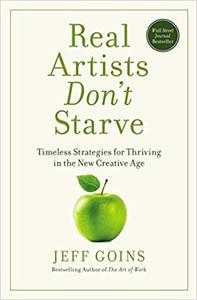The Book In A Single Sentence
There’s no need to suppress your inner artist or lead a life of happiness: you can do what you love and thrive as well.
Get Real Artists Don’t Starve on Amazon.
Personal Thoughts
Real Artists Don’t Starve is the blueprint for anyone who wants to do any creative work in the modern age. Everyone says they appreciate art, but ask them to take out their wallets, and most will hesitate. This book is great in how it gives you a framework for understanding art and commerce: it really shows that real artists don’t starve.
Book Notes
- Take the right risks: creative dreams aren’t launched overnight. They are built gradually. If you don’t have to go all in, don’t. Most significant change begins with a simple step, not a giant leap.
- You are who you say you are. Put the title ‘writer’ on your business card and email signature. You have to take yourself seriously before you expect others to.
- John Grisham,
best-selling author and pioneer of the legal thriller genre, left his law practice to pursue writing full time only after two best-sellers. - Keep reinventing yourself. Art is always found on the fringes, at the edge of our discomfort where true change occurs.
- Being original is overrated. Being able to reproduce an earlier work was not something to be ashamed of during the Renaissance – it was a point of pride.
- Study the greats. Begin as a copycat, end as a master.
- The creative process is done right when others are now compelled to steal from you. You’ve done your job when you are no longer the thief but the one being robbed.
- Starving Artists wait for their big breaks. Thriving Artists become apprentices in their craft.
- The difference between someone who made it and someone who did not ultimately
came down to two factors: who helped them, and how hard they worked. - “We are stubborn on vision. We are flexible on details” – Jeff Bezos
- In creative work, quality is subjective. We need authorities on art. We need someone to tell us Bob Dylan is a genius and Vincent van Gogh was ahead of his time. Otherwise, we are left to make such determinations on our own, and we are often mistaken about who ends up being a genius.
- There are connoisseurs – tastemakers – who make or break a career, depending on whether they vouch for you. We need these people to not only help us decide what good art is but also to help us succeed at artists ourselves.
- Use your day job to practice. Art costs money, and there’s no guarantee that your creative work will generate enough money for you to live off. Don’t opt out of the system – embrace it.
- The rule of the scene: places and people shape the success of our work more than we realise. Location is not irrelevant. Place matters. Hotspots of creativity, when properly harnessed, can become powerful spurs to creative work.
- Not every art student becomes an artist. Some become curators, community organisers, and patrons; others become collectors, dealers and auction house owners. A network is more than a team of cheerleaders; it’s a diverse group of individuals who offer a set of skills and resources that help each member succeed.
- A network is your insurance against anonymity. The greater access you have to influential people in your field, the further your work will spread.
- If you want to do world-changing creative work, you must reconcile the fact that you likely won’t be able to do it alone. You need help. Find your band of misfits, use the accountability of that group, and let your sense of competition drive you to create work.
- “In order to be found, you have to be findable” –
Austin Kleon, Show Your Work - The comedian Chris Rock shows up unannounced in small night-clubs. He tests his new material. Sometimes it goes so poorly that people get up and leave. Or they laugh at him, not with him. There is no better way to improve than to put your work out there and risk rejection. You have to practice in public.
- When we undervalue our work, we end up playing the martyr, resenting the free gig halfway through the process. If you don’t get paid, it erodes the love of your craft.
- Charge for your art. It has nothing to do with money. It’s a matter of taking yourself seriously and seeing others do the same.
- Make money to make art. “Money exists, in my world, to buy me another season.” – Steven Pressfield
